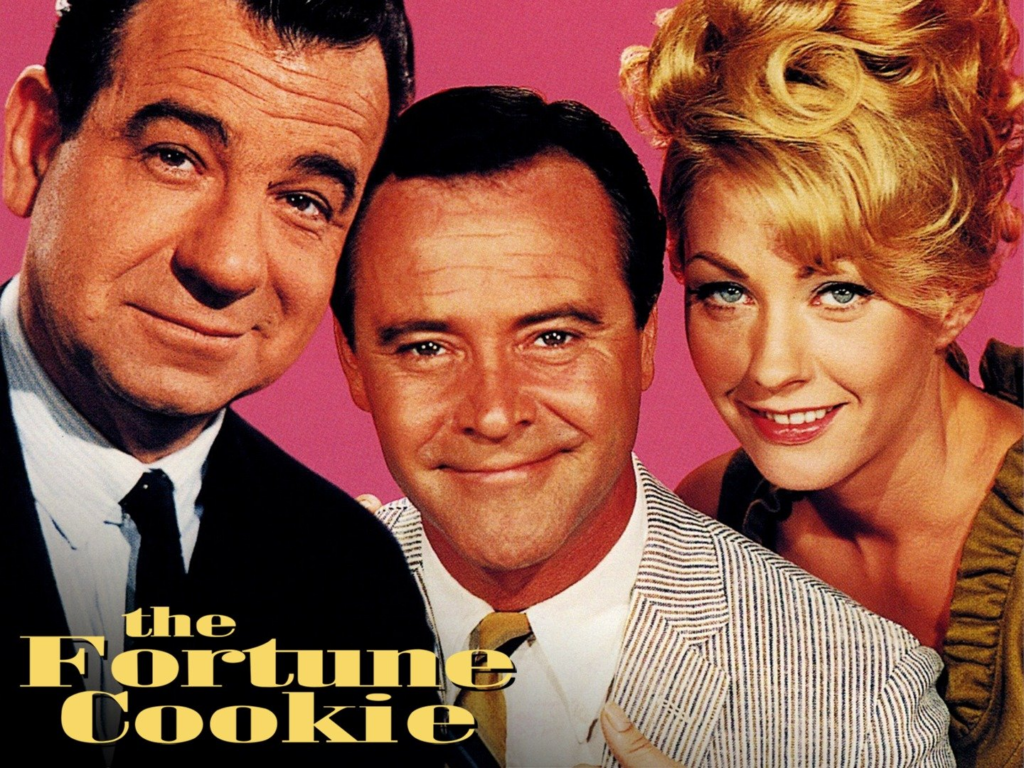
FORTUNE COOKIE, THE
(director/writer: Billy Wilder; screenwriter: I.A.L. Diamond; cinematographer: Joseph La Shelle; editor: Daniel Mandell; music: Andre Previn; cast: Jack Lemmon (Harry Hinkle), Walter Matthau (Willie Gingrich), Ron Rich (Luther “Boom Boom” Jackson), Judi West (Sandy Hinkle), Cliff Osmond (Purkey), Lurene Tuttle (Mother Hinkle), Maryesther Denver (Nurse), Ann Shoemaker (Sister Veronica); Runtime: 125; MPAA Rating: NR; producer: Billy Wilder; United Artists; 1966)
“Saddled with a thin story.”
Reviewed by Dennis Schwartz
One of movie’s great teams, Jack Lemmon and Walter Matthau, come together for the first time in The Fortune Cookie (they made 13 films together) and Matthau does wonders for this slight story it doesn’t quite deserve. Billy Wilder (“Sunset Boulevard”/”Double Indemnity”/”Fedora”) directs a bitter-sweet comedy that has some amusing moments but is overlong, too rambling and saddled with a thin story. Its cynical comedy has a field day poking fun at America’s out-of-whack litigation practices, worship of sports, hold on by the media, and the greedy lawyers and their dishonest clients. Matthau won a supporting actor Oscar for his role as the ambulance-chasing lawyer. It’s cowritten by Wilder and his regular collaborator I.A.L. Diamond.
Jack Lemmon is the bland Harry Hinkle, a CBS cameraman who accidentally gets run-over by Cleveland Browns star Luther “Boom Boom” Jackson (Ron Rich), a fictional black football player, while on the sidelines covering a football game at Municipal Stadium. Harry’s brother-in-law, Willie Gingrich (Walter Matthau), otherwise known as Whiplash Willie, sees this as an opportunity to sue the football team, CBS, and the stadium for a million dollars and the not seriously injured Harry’s asked to fake a neck injury. The hypochondriac patient has less trouble faking the injury than dealing with his underhanded brother-in-law, his greedy ex-wife (Judi West) who returns only because she thinks he might be rich, his ill-humored mother (Lurene Tuttle) and the sweet-natured but not too bright football player friend whose game slips as he feels guilty about injuring so severely the innocent cameraman.
The film soon wore out its initial amusing offering with its extended one-hook plotline about materialistic dreamers, a bunch of misogynist characters, a spineless Lemmon, and its repeated mordant comments about America’s society becoming so debased. It runs on empty for far too long until it gives up its farce, as Lemmon can’t take it anymore–which is the same feeling I had.
REVIEWED ON 3/18/2007 GRADE: C+
© ALL RIGHTS RESERVED DENNIS SCHWARTZ